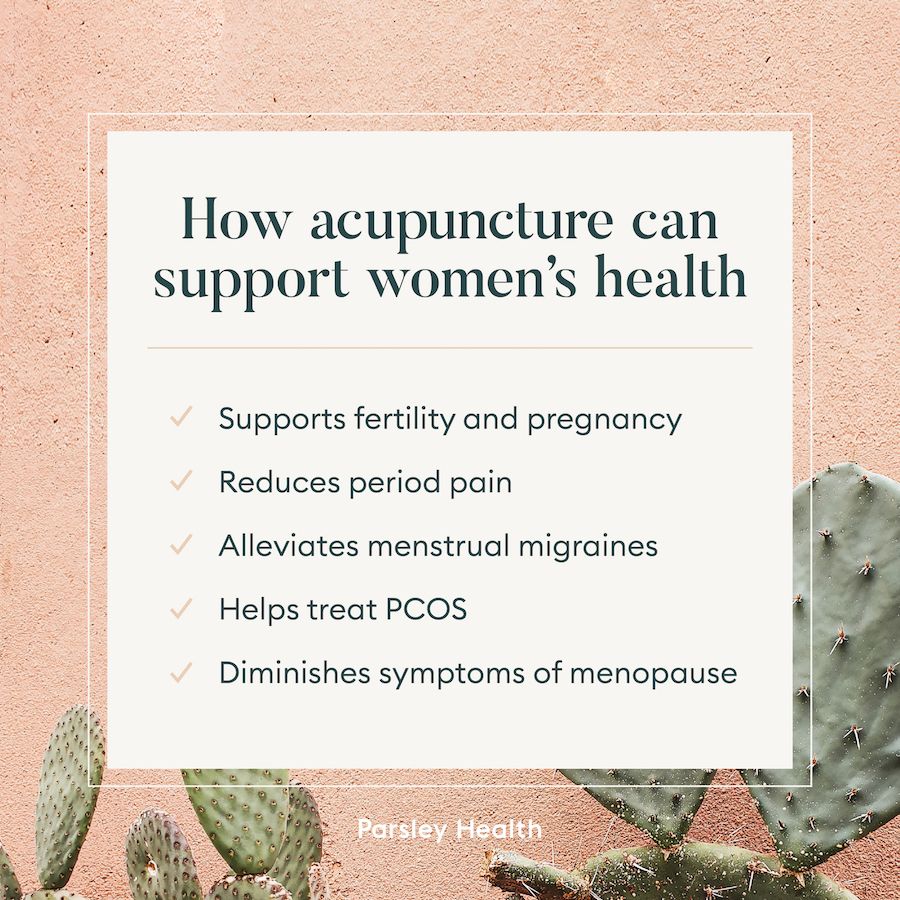Hormonal imbalances can cause a range of symptoms and health issues, from infertility and PCOS to PMS. Treating these issues at the root involves a multi-pronged approach that often includes comprehensive nutritional support, supplements, and lifestyle changes, as well as complementary treatments.
Acupuncture for hormones, fertility, and more is one promising complementary treatment.
Although not a fancy new intervention, acupuncture and other modalities of Chinese and East Asian medicine have been used to treat health for centuries. And some preliminary studies suggest acupuncture may be beneficial.
Parsley Health providers often recommend specialized treatments such as acupuncture as part of an overall health plan for hormonal issues. Learn how this ancient practice may help support your hormones.
How does acupuncture work?
Acupuncture is a complementary medical treatment that aims to stimulate certain physical points—called acupoints—on the body, most often with fine, sterile needles that penetrate the skin’s surface.
Acupuncture can also include electroacupuncture therapy, moxibustion or heat-based therapy, and auricular or ear-based therapy.
Despite numerous studies undertaken to define the significance of acupuncture points, no clear evidence exists. While many people say they've experienced benefits from acupuncture, some scientific research has suggested the placebo effect is at play.
For those interested, here's how it works. Acupuncturists believe that many medical ailments stem from an internal imbalance that stifles the natural flow of blood, hormones, and chemical messengers throughout the body.
The mechanism by which acupuncture is thought to work is by releasing these blockages and stimulating the body’s natural flow. By doing this, the body is thought to be able to return to a state of homeostasis, therefore allowing for a restoration of balance.
3 potential mechanisms that may aid fertility
Accupuncture impacts the autonomic nervous system and the release of neurotransmitters.
Accupuncture has been shown on MRI to increase blood flow to the brain's white matter.
Accupuncture may help by shifting hormones.
An acupuncturist takes time to learn about your current symptoms and health history and then stimulates acupoints that correlate to your chief health concerns.
In traditional acupuncture, the needles are thought to help to stimulate the body’s nervous system, thereby supporting the release of endorphins and other chemicals in the muscles, spinal cord, and brain.
As a result, these chemicals and hormones may serve as natural painkillers that may also boost blood flow and change brain activity—helping to correct underlying ailments and imbalances within the body.

How can acupuncture support hormonal health?
Acupuncture can be a complementary modality for many types of health concerns, including those regarding your hormones.
1. May support fertility and pregnancy
About 8 to 12 percent of couples worldwide face fertility problems. In recent years, that percentage has continued to rise. Could acupuncture be of benefit?
In people assigned female at birth, acupuncture has been found to produce positive effects in supporting both ovarian and follicular function while also increasing blood flow to the endometrium. The endometrium is the mucus membrane that surrounds the uterus.
Endometrial thickness is essential in pregnancy, as it supports successful implantation of the embryo in the uterus. Because of this, acupuncture has also become a frequently used treatment prior to in-vitro fertilization (IVF). The hope is that it will increase the chances of successful pregnancy while also helping to reduce stress.
In those assigned male at birth, acupuncture for fertility may also beneficial. It may help improve sperm quality and motility and boost blood flow to the male reproductive organs.
Additionally, the effect of stress reduction associated with acupuncture treatment is thought to independently impact fertility outcomes.
Acupuncture may help to decrease cortisol levels in the brain. An elevated cortisol level can disrupt the functioning of the pituitary gland—a pea-sized structure at the base of the brain that regulates a number of hormones, including those involved in reproduction.
Acupuncture is approved for use during pregnancy and may help to manage common prenatal symptoms, such as morning sickness, nausea, aches, pains, low back pain, and anxiety.
2. May reduce period pain
A report in the journal Human Reproduction Update found that up to 95 percent of menstruating people report having some form of period pain, also known as dysmenorrhea. Commonly, dysmenorrhea can involve intense uterine cramping or blood clotting that occurs during menstruation.
Recent studies show that acupuncture might ease period pain. A study from 2017 found that acupuncture helped to regulate participants' menstrual cycles, thereby lessening menstrual pain and normalizing blood flow.
The study found that those who received three acupuncture treatments—one week prior to their menstrual period over three consecutive cycles—experienced significant improvements in period pain intensity and overall quality of life.
Similar results were found in a meta-analysis of 60 randomized controlled trials that investigated the efficacy of acupuncture to help with dysmenorrhea. Compared to no treatment or the use of NSAIDs (such as aspirin and ibuprofen), acupuncture helped to more effectively reduce menstrual pain and associated symptoms.
3. May alleviate menstrual migraine
Migraine attacks right before, during, or right after your period, are called menstrual migraine. Menstrual migraine is tied to changes in hormone levels that occur during your monthly cycle.
Menstrual migraine affects roughly 60 percent of people who menstruate. Acupuncture is one way to potentially reduce the frequency, duration, and intensity of migraine attacks.
A systematic review of 22 clinical trials about acupuncture for migraine found that, of the 4,985 participants studied, frequency of migraine attacks decreased by 50 percent or more in up to 59 percent of those who were receiving acupuncture.
The biological mechanism behind how acupuncture may ease migraine pain remains unclear. Researchers think that the needles placed on specific pressure points on the back, head, or neck may help to activate pathways in the body that play an essential role in turning pain off.
4. May help treat PCOS
Polycystic ovary syndrome—commonly referred to as PCOS—is a condition that affects 1 in 10 people assigned female at birth of childbearing age. It is a common cause of infertility.
People with PCOS have a hormonal imbalance and corresponding metabolic issues that can commonly cause irregular periods, difficulty getting pregnant, and weight gain.
Several recent clinical studies have found that acupuncture may help with treating the ovulatory dysfunction and insulin sensitivity often associated with PCOS.
Having increased levels of androgens, such as testosterone, is a feature of the condition. Acupuncture has been reported to decrease testosterone in patients with PCOS.
Acupuncture may also work by acting on the system in the brain that releases hormones—leading to a decrease in the release of luteinizing hormone from the pituitary gland. This can also suppress the release of androgens from the ovaries.
5. May diminish symptoms of menopause
Perimenopause can last for a decade or more. During this time, people may begin to experience some of the classic menopause symptoms, such as hot flashes, night sweats, sleep disturbances, mood changes, and vaginal dryness.
A recent study from 2019 looked at 70 people experiencing menopause. The researchers found that when the participants received just a 15-minute session of standard acupuncture once a week, they noted a decrease in hot flashes after three weeks.
And 80 percent reported improvements in the severity or frequency of sweating (including night sweats), sleep disturbances, emotional symptoms, and skin, and hair changes at the six-week mark.
Acupuncture for menopause may also be an alternative for those who are not a candidate for hormone replacement therapy.
How often do you need to go to acupuncture to see improvements?
Similar to physical therapy, acupuncture is a process-oriented intervention. This means that consecutive sessions may provide the best results.
For hormonal issues that pertain to fertility, period pain, and menstrual migraine, you may wish to attend acupuncture sessions or use an acupressure mat on a weekly basis for at least three to four months before determining whether it’s having the intended effect.


